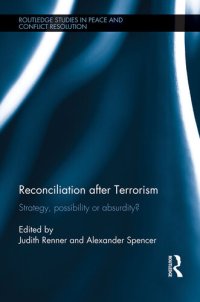
Ebook: Reconciliation After Terrorism: Strategy, Possibility or Absurdity?
Author: Judith Renner, Alexander Spencer
- Genre: Other Social Sciences // Politics
- Series: Routledge Studies in Peace and Conflict Resolution
- Year: 2011
- Publisher: Routledge
- City: London
- Language: English
- epub
Reconciliation after Terrorism brings together scholars from the hitherto disparate fields of terrorism and reconciliation studies, in order to examine whether reconciliation is a possible strategy for dealing with and ending a terrorist conflict.
Although terrorist activities often play a role in situations of conflict and transition, terrorists are generally not taken into consideration as active participants by researchers and practitioners. In some cases, the terrorists turn into political actors during the reconciliation process and their past is not an issue anymore, as it was the case with the ANC in South Africa. This book examines the notion of reconciliation with terrorists from a theoretical and empirical perspective.
The notion of engagement and reconciliation with terrorist groups is generally seen as problematic, if not impossible. This is somewhat surprising, given that the idea of societal reconciliation has become a common response to state terror- although not usually in situations of conflict with sub-state terrorist actors. Similar to state terror, sub-state terrorism is a sign of a deep societal rift which reconciliation measures may help to overcome. The text investigates the reconciliatory process further, raising the central questions: (a) what constitutes ‘reconciliation’ as a process and an outcome; and (b) how can reconciliation be facilitated in a situation of social conflict.
This book will be of much interest to students of terrorism studies, transitional justice, conflict resolution, peace and conflict studies and IR in general.
Although terrorist activities often play a role in situations of conflict and transition, terrorists are generally not taken into consideration as active participants by researchers and practitioners. In some cases, the terrorists turn into political actors during the reconciliation process and their past is not an issue anymore, as it was the case with the ANC in South Africa. This book examines the notion of reconciliation with terrorists from a theoretical and empirical perspective.
The notion of engagement and reconciliation with terrorist groups is generally seen as problematic, if not impossible. This is somewhat surprising, given that the idea of societal reconciliation has become a common response to state terror- although not usually in situations of conflict with sub-state terrorist actors. Similar to state terror, sub-state terrorism is a sign of a deep societal rift which reconciliation measures may help to overcome. The text investigates the reconciliatory process further, raising the central questions: (a) what constitutes ‘reconciliation’ as a process and an outcome; and (b) how can reconciliation be facilitated in a situation of social conflict.
This book will be of much interest to students of terrorism studies, transitional justice, conflict resolution, peace and conflict studies and IR in general.
Download the book Reconciliation After Terrorism: Strategy, Possibility or Absurdity? for free or read online
Continue reading on any device:

Last viewed books
Related books
{related-news}
Comments (0)